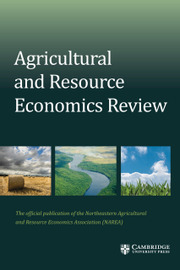Article contents
A Review of Alternative Expectations Regimes in Commodity Markets: Specification, Estimation, and Hypothesis Testing Using Structural Models
Published online by Cambridge University Press: 15 September 2016
Abstract
Price expectations play a critical role in commodity markets where producers must make input decisions well before output is realized. This paper brings together alternative expectations regimes, their estimation, and hypothesis tests for use in structural commodity models to determine their use by commodity producers. Extrapolative mechanisms and rational expectations are considered under risk neutrality and risk aversion. The assumptions implicit in the use of aggregate data in these models are made explicit. Structural models using individual survey data are discussed. While Muth's rational expectations hypothesis has found widespread acceptance in the macroeconomic literature, empirical results from industry studies indicate that commodity producers may have heterogeneous price expectations, with no single expectations hypothesis dominating. This is not surprising given that different producers possess different information and have different costs associated with information collection and processing.
- Type
- Articles
- Information
- Copyright
- Copyright © 1996 Northeastern Agricultural and Resource Economics Association
References
- 3
- Cited by


